高考英语模拟试题1(济南外国语学校)2018年10月
- 格式:doc
- 大小:77.00 KB
- 文档页数:8
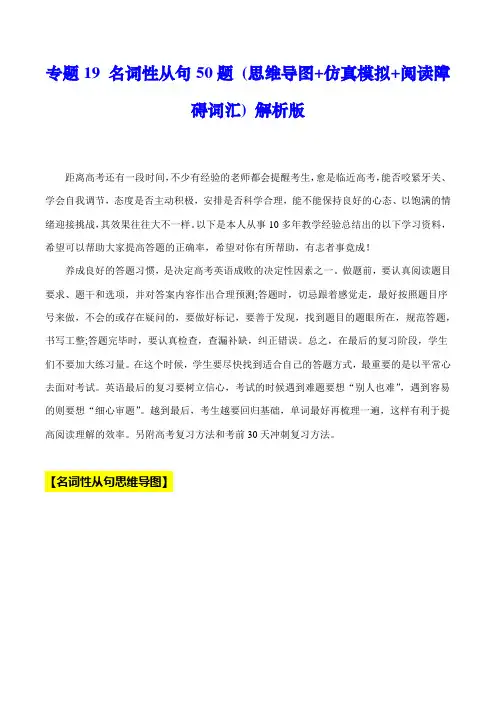
专题19 名词性从句50题(思维导图+仿真模拟+阅读障碍词汇) 解析版距离高考还有一段时间,不少有经验的老师都会提醒考生,愈是临近高考,能否咬紧牙关、学会自我调节,态度是否主动积极,安排是否科学合理,能不能保持良好的心态、以饱满的情绪迎接挑战,其效果往往大不一样。
以下是本人从事10多年教学经验总结出的以下学习资料,希望可以帮助大家提高答题的正确率,希望对你有所帮助,有志者事竟成!养成良好的答题习惯,是决定高考英语成败的决定性因素之一。
做题前,要认真阅读题目要求、题干和选项,并对答案内容作出合理预测;答题时,切忌跟着感觉走,最好按照题目序号来做,不会的或存在疑问的,要做好标记,要善于发现,找到题目的题眼所在,规范答题,书写工整;答题完毕时,要认真检查,查漏补缺,纠正错误。
总之,在最后的复习阶段,学生们不要加大练习量。
在这个时候,学生要尽快找到适合自己的答题方式,最重要的是以平常心去面对考试。
英语最后的复习要树立信心,考试的时候遇到难题要想“别人也难”,遇到容易的则要想“细心审题”。
越到最后,考生越要回归基础,单词最好再梳理一遍,这样有利于提高阅读理解的效率。
另附高考复习方法和考前30天冲刺复习方法。
【名词性从句思维导图】【名词性从句高考考查动向】动向一、连接词that和what用法区别动向二、连接词whatever和whichever区别动向三、连接词if和whether用法区别【小题狂练一】最新模拟试题考点再现在空白处填1个适当的单词或括号内单词的正确形式。
1.【2023届山东省济南市高三一模】Nanhan has a long history of producing ____38____have been widely recognized as fine crafts (工艺品) at home and abroad.1. what。
考查宾语从句。
句意:南汉有着生产在国内外都被广泛认可为精品工艺品的悠久的历史。
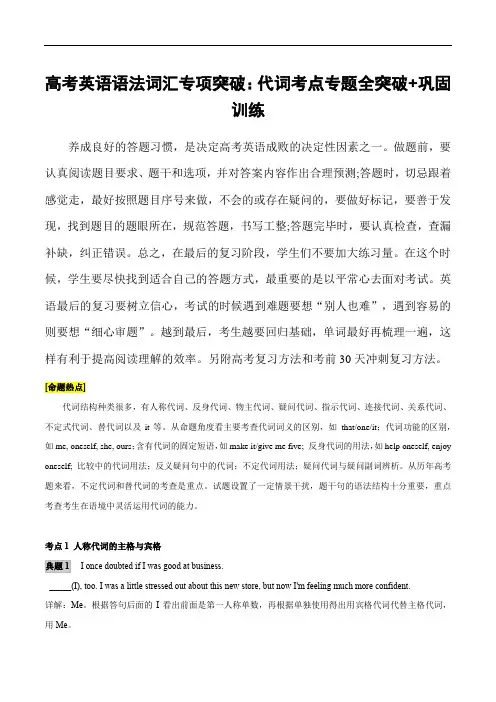
高考英语语法词汇专项突破:代词考点专题全突破+巩固训练养成良好的答题习惯,是决定高考英语成败的决定性因素之一。
做题前,要认真阅读题目要求、题干和选项,并对答案内容作出合理预测;答题时,切忌跟着感觉走,最好按照题目序号来做,不会的或存在疑问的,要做好标记,要善于发现,找到题目的题眼所在,规范答题,书写工整;答题完毕时,要认真检查,查漏补缺,纠正错误。
总之,在最后的复习阶段,学生们不要加大练习量。
在这个时候,学生要尽快找到适合自己的答题方式,最重要的是以平常心去面对考试。
英语最后的复习要树立信心,考试的时候遇到难题要想“别人也难”,遇到容易的则要想“细心审题”。
越到最后,考生越要回归基础,单词最好再梳理一遍,这样有利于提高阅读理解的效率。
另附高考复习方法和考前30天冲刺复习方法。
[命题热点]代词结构种类很多,有人称代词、反身代词、物主代词、疑问代词、指示代词、连接代词、关系代词、不定式代词、替代词以及it等。
从命题角度看主要考查代词词义的区别,如that/one/it;代词功能的区别,如me, oneself, she, ours;含有代词的固定短语,如make it/give me five; 反身代词的用法,如help oneself, enjoy oneself; 比较中的代词用法;反义疑问句中的代词;不定代词用法;疑问代词与疑问副词辨析。
从历年高考题来看,不定代词和替代词的考查是重点。
试题设置了一定情景干扰,题干句的语法结构十分重要,重点考查考生在语境中灵活运用代词的能力。
考点1 人称代词的主格与宾格_____(I), too. I was a little stressed out about this new store, but now I'm feeling much more confident.详解:Me。
根据答句后面的I看出前面是第一人称单数,再根据单独使用得出用宾格代词代替主格代词,用Me。
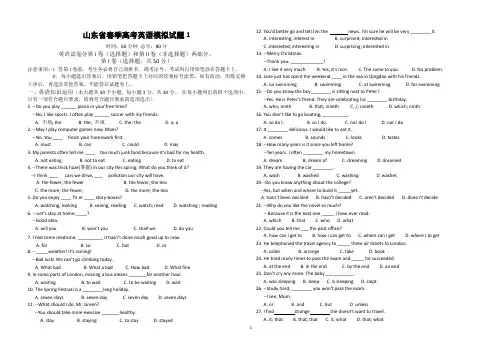
山东省春季高考英语模拟试题1时间:60分钟总分:80分英语试卷分第I卷(选择题)和第II卷(非选择题)两部分。
第I卷(选择题,共50分)注意事项:I. 答第I卷前,考生务必将自己的姓名、准考证号、考试科目用铅笔涂在答题卡上。
II.每小题选出答案后,用铅笔把答题卡上对应的答案标号涂黑。
如有改动,用橡皮擦干净后,再选涂其他答案。
不能答在试题卷上。
一、英语知识运用(本大题共30个小题,每小题1分,共30分。
在每小题列出的四个选项中,只有一项符合题目要求,请将符合题目要求的选项选出)1. --Do you play ______ piano in your free time?--No, I like sports. I often play ______ soccer with my friends.A. 不填; theB. the; 不填C. the; theD. a; a2. --May I play computer games now, Mom?--No. You ____finish your homework first.A. mustB. canC. couldD. may3. My parents often tell me ____too much junk food because it’s bad for my health.A. not eatingB. not to eatC. eatingD. to eat4. --There was thick haze(雾霾) in our city this spring. What do you think of it?--I think ____ cars we drive, ___ pollution our city will have.A. the fewer; the fewerB. the fewer; the lessC. the more; the fewer;D. the more; the less5. Do you enjoy ____ TV or ____ story-books?A. watching; lookingB. seeing; readingC. watch; readD. watching ; reading6. ---Let’s stay at home, ____?--Good idea.A. will youB. won’t youC. shall weD. do you7. I had s ome medicine, __________ it hasn’t done much good up to now.A. forB. soC. butD. or8. --_____weather! It’s raining!--Bad luck! We can’t go climbing today.A. What badB. What a badC. How badD. What fine9.In some parts of London, missing a bus means _______for another hour.A. waitingB. to waitC. to be waitingD. wait10. The Spring Festival is a ________long holiday.A. seven-daysB. seven-dayC. seven dayD. seven days11. --What should I do, Mr. Green?--You should take more exercise _______healthy.A. stayB. stayingC. to stayD. stayed 12.You'd better go and tell Jim the news. I'm sure he will be very ________ it.A. interesting; interest inB. surprised; interested inC .interested; interesting in D. surprising; interested in13. --Merry Christmas.--Thank you. _____________!A. I like it very much.B. Yes, it’s nice.C. The same to you.D. No problem.14. Jane just has spent the weekend ____ in the sea in Qingdao with his friends.A. on swimmingB. swimmingC. at swimmingD. for swimming15. --Do you know the boy________ is sitting next to Peter?--Yes. He is Peter's friend. They are celebrating his ________ birthday.A. who; ninthB. that; ninethC. /; ninethD. which; ninth16. You don’t like to go boating, __________.A. so do I.B. so I do.C. nor do ID. nor I do17. It ________ delicious. I would like to eat it.A. comesB. soundsC. looksD. tastes18. --How many years is it since you left home?--Ten years. I often ________ my hometown.A. dreamB. dream ofC. dreamingD. dreamed19. They are having the car ________.A. washB. washedC. washingD. washes20.--Do you know anything about the college?--Yes, but when and where to build it _____yet.A. hasn’t been decidedB. hasn’t decidedC. are n’t decidedD. doesn’t decide21. --Why do you like the novel so much?-- Because it is the best one _____ I have ever read.A. whichB. thatC. whoD. what22. Could you tell me ___ the post office?A. how can I get toB. how I can get toC. where can I getD. where I to get23. He telephoned the travel agency to _____ three air tickets to London.A. orderB. arrangeC. takeD. book24. He tried many times to pass the exam and _____ he succeeded.A. at the endB. in the endC. by the endD. an end25. Don’t cry any more. The baby ___________.A. was sleepingB. sleepC. is sleepingD. slept26. --Study hard, ________ you won't pass the exam.--I see, Mum.A. orB. andC. butD. unless27. I find strange she doesn't want to travel.A. it; thatB. that; thatC. it; whatD. that; what28.-- Excuse me. sir. How far is Blue Sky Supermarket?-- About walk.A. 20 minute'sB.20 minutes'C. 20 minutesD. 20 minute29.--Can you finish your work before dark?--_________ .A. No problemB. That's OKC. Never mindD. With pleasure30. -- Let’s go and have sports together.--__________.A. Yes, please.B. You’re welcome.C. That’s a good id ea.D. It’s all right.二.阅读理解(本大题共10个小题,每小题2分,共20分。
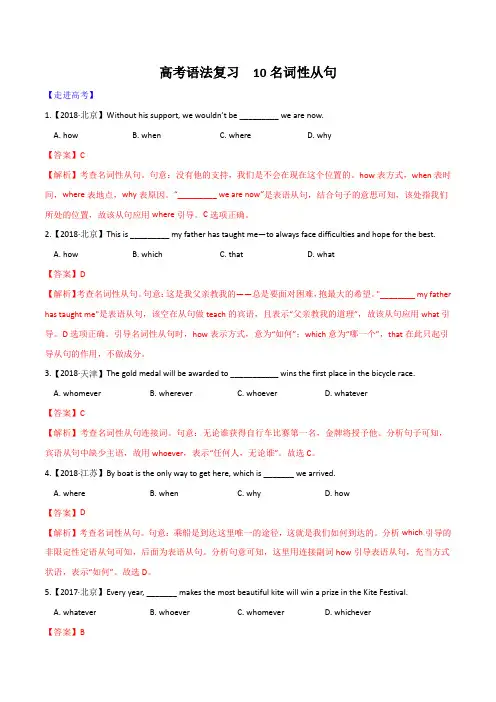
高考语法复习10名词性从句【走进高考】1.【2018·北京】Without his support, we wouldn’t be _________ we are now.A. howB. whenC. whereD. why【答案】C【解析】考查名词性从句。
句意:没有他的支持,我们是不会在现在这个位置的。
how表方式,when表时间,where表地点,why表原因。
“_________ we are now”是表语从句,结合句子的意思可知,该处指我们所处的位置,故该从句应用where引导。
C选项正确。
2.【2018·北京】This is _________ my father has taught me—to always face difficulties and hope for the best.A. howB. whichC. thatD. what【答案】D【解析】考查名词性从句。
句意:这是我父亲教我的——总是要面对困难,抱最大的希望。
"________ my father has taught me"是表语从句,该空在从句做teach的宾语,且表示“父亲教我的道理”,故该从句应用what引导。
D选项正确。
引导名词性从句时,how表示方式,意为“如何”;which意为“哪一个”,that在此只起引导从句的作用,不做成分。
3.【2018·天津】The gold medal will be awarded to ___________ wins the first place in the bicycle race.A. whomeverB. whereverC. whoeverD. whatever【答案】C【解析】考查名词性从句连接词。
句意:无论谁获得自行车比赛第一名,金牌将授予他。
分析句子可知,宾语从句中缺少主语,故用whoever,表示“任何人,无论谁”。
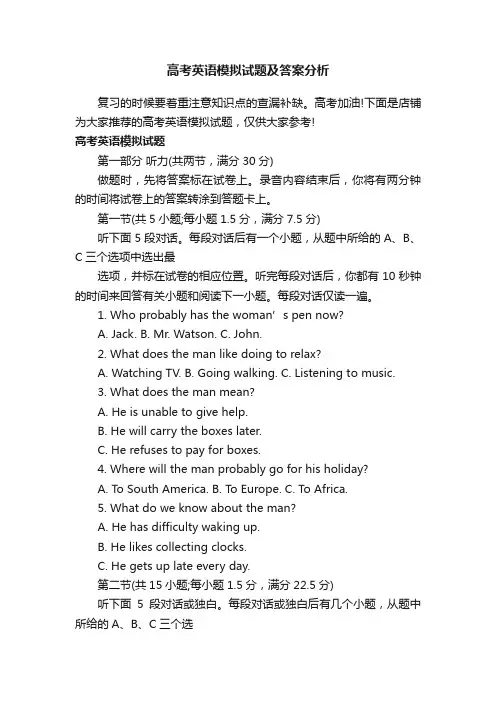
高考英语模拟试题及答案分析复习的时候要着重注意知识点的查漏补缺。
高考加油!下面是店铺为大家推荐的高考英语模拟试题,仅供大家参考!高考英语模拟试题第一部分听力(共两节,满分30分)做题时,先将答案标在试卷上。
录音内容结束后,你将有两分钟的时间将试卷上的答案转涂到答题卡上。
第一节(共5小题;每小题1.5分,满分7.5分)听下面5段对话。
每段对话后有一个小题,从题中所给的A、B、C三个选项中选出最选项,并标在试卷的相应位置。
听完每段对话后,你都有10秒钟的时间来回答有关小题和阅读下一小题。
每段对话仅读一遍。
1. Who probably has the woman’s pen now?A. Jack.B. Mr. Watson.C. John.2. What does the man like doing to relax?A. Watching TV.B. Going walking.C. Listening to music.3. What does the man mean?A. He is unable to give help.B. He will carry the boxes later.C. He refuses to pay for boxes.4. Where will the man probably go for his holiday?A. To South America.B. To Europe.C. To Africa.5. What do we know about the man?A. He has difficulty waking up.B. He likes collecting clocks.C. He gets up late every day.第二节(共15小题;每小题1.5分,满分22.5分)听下面5段对话或独白。
每段对话或独白后有几个小题,从题中所给的A、B、C三个选项中选出最佳选项,并标在试卷的相应位置。
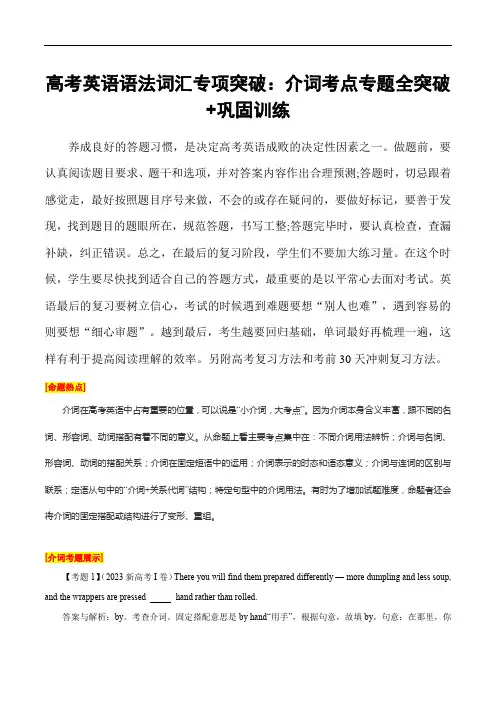
高考英语语法词汇专项突破:介词考点专题全突破+巩固训练养成良好的答题习惯,是决定高考英语成败的决定性因素之一。
做题前,要认真阅读题目要求、题干和选项,并对答案内容作出合理预测;答题时,切忌跟着感觉走,最好按照题目序号来做,不会的或存在疑问的,要做好标记,要善于发现,找到题目的题眼所在,规范答题,书写工整;答题完毕时,要认真检查,查漏补缺,纠正错误。
总之,在最后的复习阶段,学生们不要加大练习量。
在这个时候,学生要尽快找到适合自己的答题方式,最重要的是以平常心去面对考试。
英语最后的复习要树立信心,考试的时候遇到难题要想“别人也难”,遇到容易的则要想“细心审题”。
越到最后,考生越要回归基础,单词最好再梳理一遍,这样有利于提高阅读理解的效率。
另附高考复习方法和考前30天冲刺复习方法。
[命题热点]介词在高考英语中占有重要的位置,可以说是“小介词,大考点”。
因为介词本身含义丰富,跟不同的名词、形容词、动词搭配有着不同的意义。
从命题上看主要考点集中在:不同介词用法辨析;介词与名词、形容词、动词的搭配关系;介词在固定短语中的运用;介词表示的时态和语态意义;介词与连词的区别与联系;定语从句中的“介词+关系代词”结构;特定句型中的介词用法。
有时为了增加试题难度,命题者还会将介词的固定搭配或结构进行了变形、重组。
[介词考题展示]【考题1】(2023新高考I卷)There you will find them prepared differently — more dumpling and less soup, and the wrappers are pressed hand rather than rolled.答案与解析:by。
考查介词。
固定搭配意思是by hand“用手”,根据句意,故填by。
句意:在那里,你会发现它们的制作方式不同——更多汤包,更少的汤,包子皮是用手压的,而不是擀出来的。
【考题2】(2023新高考II卷)And who do they speak English ______?答案与解析:with。

填写板块限时模拟训练01语法填空+应用文写作+读后续写时间:45分钟满分:55分Ⅰ.语法填空(共10小题,每小题1.5分,满分15分)(2022·邵阳一模)Scientists say soft robot jellyfish that can swim through openings ____36____(narrow)than their bodies could be used to observe coral reefs. In future the “jellybots” could be sent into delicate environments, such as coral reefs, without risking damage. Their creators believe they could act ____37____ “guardians of the oceans”.Dr Erik Engeberg, one of the robot’s ____38____(inventor)from Florida Atlantic University in the US, said, “____39____(study)and observing delicate environment has always been hard for researchers. Soft robots can help with this.”The design of the jelly bot is based on ____40____ shape of the moon jellyfish. The team used a system ____41____(drive)by two impeller pumps(叶轮系)to allow the robot to swim.Dr Engeberg said, “Soft robots based on fish and other sea animals ____42____(win)popularity in the research community in the last few years. Jellyfish, are excellentchoices,____43____ that they are very efficient swimmers. Their ____44____(perform)is due to the shape of their bodies,_____45_____ can produce a combination of vortex(漩涡)and jet propulsion(推进).”Ⅰ.写作(共两节,满分40分)第一节应用文写作(满分15分)(2022·江苏八校联考)假设你是李华,最近你要参加主题为“My Dream University”的英语演讲比赛。
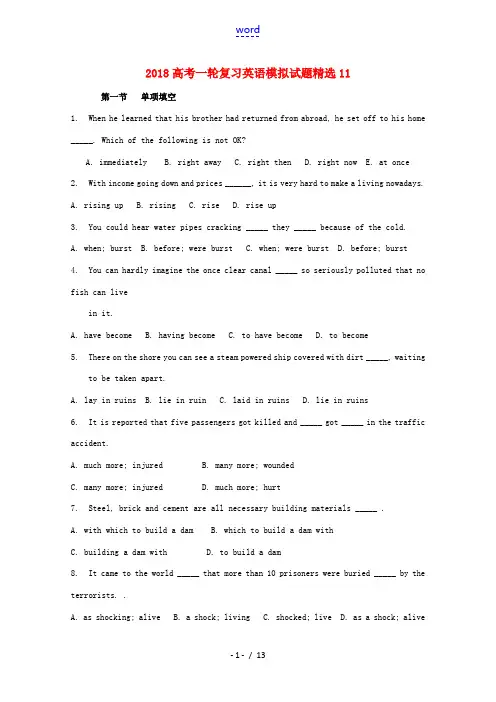
2018高考一轮复习英语模拟试题精选11第一节单项填空1. When he learned that his brother had returned from abroad, he set off to his home _____. Which of the following is not OK?A. immediatelyB. right awayC. right thenD. right nowE. at once2. With income going down and prices ______, it is very hard to make a living nowadays.A. rising upB. risingC. riseD. rise up3. You could hear water pipes cracking _____ they _____ because of the cold.A. when; burstB. before; were burstC. when; were burstD. before; burst4. You can hardly imagine the once clear canal _____ so seriously polluted that no fish can livein it.A. have becomeB. having becomeC. to have becomeD. to become5. There on the shore you can see a steam powered ship covered with dirt _____, waitingto be taken apart.A. lay in ruinsB. lie in ruinC. laid in ruinsD. lie in ruins6. It is reported that five passengers got killed and _____ got _____ in the traffic accident.A. much more; injuredB. many more; woundedC. many more; injuredD. much more; hurt7. Steel, brick and cement are all necessary building materials _____ .A. with which to build a damB. which to build a dam withC. building a dam withD. to build a dam8. It came to the world _____ that more than 10 prisoners were buried _____ by the terrorists. .A. as shocking; aliveB. a shock; livingC. shocked; liveD. as a shock; alive9. When the earthquake, a destructive natural disaster, happened, ninety-nine coalminers were trapped in the coal mine _____the ruins, waiting _____.A. in; to be rescuedB. under; for being rescuedC. in; to rescueD. under; to be rescued10. Electricity plays _____ part in our life that it is unimaginable to live without it.A. such importantB. so importantC. such important aD. so important a11. We should have ourselves _____ if we want to get the work _____ in the given time.A. organize well; finishedB. well organized; doneC. well organized; to be finishedD. to be organized well; to be done12. The story that happened 30 years ago still remains ____ in my mind as if it _____yesterday.A. clean; happenedB. fresh; happenedC. clear; was happenedD. clearly; happened13. ---Will you please help me _____ the exercise books to the students?----Sorry I have been in a race and my strength has completely _____.A. give out; given outB. give off; given upC. give out; given inD. give up; given up14. Seventy percent of the students _____ taken part in the work and seventy percentof the work _____been finished.A. has, hasB. had , hadC. has, haveD. have, has15. He was honored _____ an outstanding scientist _____ his contribution to the economic reform.A. as; becauseB. after; forC. as; forD. for; for16. People can make silly mistakes about a person if they judge him ____ the clothes he wears.A. byB. withC. accordingly toD. through17. Remember never to ask a European and an American personal questions. It is almostcertain that they ______ for it .A. are not preparedB. don’t prepareC. haven’t preparedD. are not preparing18. It will at least take five months to repair the ship that was seriously _____ by the hurricane.A. destructedB. ruinedC. damagedD. broken19. Thousands and thousands of people lost their homes in the earthquake and it wasimpossible to provide them _____ enough food, clothing and _____at that time.A. with; shelterB. for; housesC. by; housingD. with; shelter20. It is reported that a large number of people _____ been killed and the number____ added up to nearly 70,000A. has; hasB. have; haveC. has; haveD. have; has21. The president was _____ a speech to senators _____ a group of armed young peopleburst into the hallA. giving; asB. making; whenC. delivering; whileD. speaking; when22. A party was held _____ the heroes who had helped saved thousands and thousandsof lives in the big earthquake in Sichuan.A. in time ofB. in honor ofC. in name ofD. in place of23. The soldiers have been trying hard to search for anyone alive buried in the ruinsand _____them out if found.A. findB. makeC. digD. let24. Many people thought it useless ______ again but the captain insisted on trying_____second time, which turned out to be a success.A. to try; theB. trying; aC. trying; theD. to try; a25. We don’t need to do extra work this evening. The day’s work was almost ______now.A. at the endB. at an endC. at one endD. at our end第二节完形填空One afternoon I was sitting at my favorite table in a restaurant, waiting for the food I had ordered to arrive. Suddenly I26___ that a man sitting at a table near the window kept glancing in my direction, as if he knew me. The man had a newspaper27___in front of him, which he was 28_____to read, but I could 29 that he was keeping an eye on me. When the waiter brought my food the man was clearly puzzled (困惑) by the 30way in which the waiter and I 31 each other. He seemed even more puzzled as time went on and it became 32 that all the waiters in the restaurant knew me. Finally he got up and went into the 33__.When he came out, he paid his bill and34____without another glance in my direction.I called the owner of the restaurant and asked what the man had 35. “Well,〞 he said, “that man was a detective (侦探). He36you here because he thought you were the man he37.〞“What?〞 I said, showing my 38____. The owner continued, “He came int o the kitchen and showed me a photo of the wanted man. I must say he looked very much like you! Of course, since we know you, we told him that he had made a 39.〞“Well, it’s really 40____I came to a restaurant where I’m known.〞I said. “Otherwise,〞 I might have been in trouble.〞26. A. knew B. understood C. noticed D. recognized27. A. flat B. open C. cut D. fixed28. A. hoping B. thinking C. pretending D. continuing29. A. see B. find C. guess D. learn30. A. direct B. familiar C.strange D.funny31. A. chatted with B. looked at C. laughed at D. talkedabout32. A. true B. hopeful C. clear D. possible33. A. restaurant B. washroom C. office D. kitchen34. A. left B. acted C. sat down D. calmed down35. A. wanted B. tried C. ordered D. wished36. A. met B. caught C. followed D. discovered37. A. was to beat B. was dealing with C. was to meet D. was looking for38. A. care B. surprise C. worry D. regret39. A. discovery B. mistake C. decision D. fortune40. A. a pity B. natural C. a chance D. lucky第一节语法填空Then, later that afternoon, another big quake (41)____ was almost as strong as the first one shook Tangshan. Some of the rescue workers and doctors (42)(trap)__________under the ruins. More buildings fell down. Water, food, and electricity were (43)___to get. People began to wonder how long the disaster (44) (last)________.All hope (45)( not lose)__________. Soon after the quakes, the army sent 150,000 soldiers to Tangshan to help the recue (46) (work)________.Hundreds of thousands of people were helped. The army organized teams to dig out those who were trapped and to bury the (47) (die)_____. To the north of the city, most of 10,000 miners were rescued (48)______the coal mines there. Workers built shelters for survivors 〔49〕___ homes had been destroyed. Fresh water was taken 〔50〕___ the city by train, truck and plane. Slowly, the city began to breathe again.第二节阅读理解阅读如下短文,从各题所给的A、B、C、D四个选项中,选出最优选项。
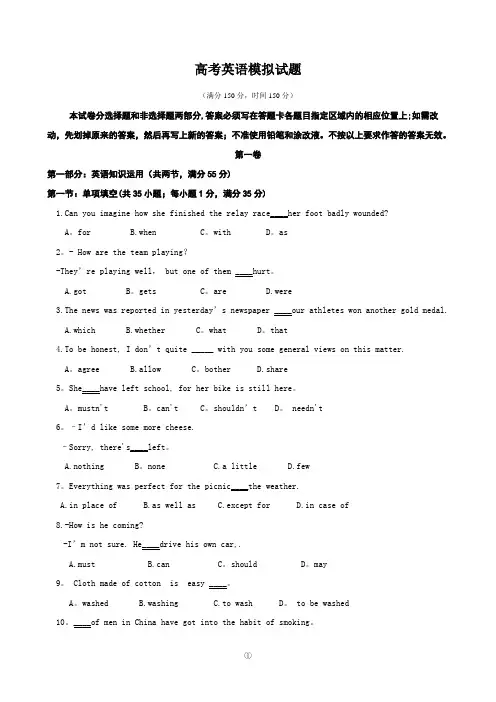
高考英语模拟试题(满分150分,时间150分)本试卷分选择题和非选择题两部分,答案必须写在答题卡各题目指定区域内的相应位置上;如需改动,先划掉原来的答案,然后再写上新的答案;不准使用铅笔和涂改液。
不按以上要求作答的答案无效。
第一卷第一部分:英语知识运用(共两节,满分55分)第一节:单项填空(共35小题;每小题1分,满分35分)1.Can you imagine how she finished the relay race____her foot badly wounded?A。
for B.when C。
with D。
as2。
- How are the team playing?-They’re playing well, but one of them ____hurt。
A.got B。
gets C。
are D.were3.The news was reported in yesterday’s newspaper ____our athletes won another gold medal.A.whichB.whether C。
what D。
that4.To be honest, I don’t quite _____ with you some general views on this matter.A。
agree B.allow C。
bother D.share5。
She____have left school, for her bike is still here。
A。
mustn't B。
can't C。
shouldn’t D。
needn't6。
–I’d like some more cheese.–Sorry, there's____left。
A.nothing B。
none C.a little D.few7。
Everything was perfect for the picnic____the weather.A.in place ofB.as well asC.except forD.in case of8.-How is he coming?-I’m not sure. He____drive his own car,.A.mustB.can C。
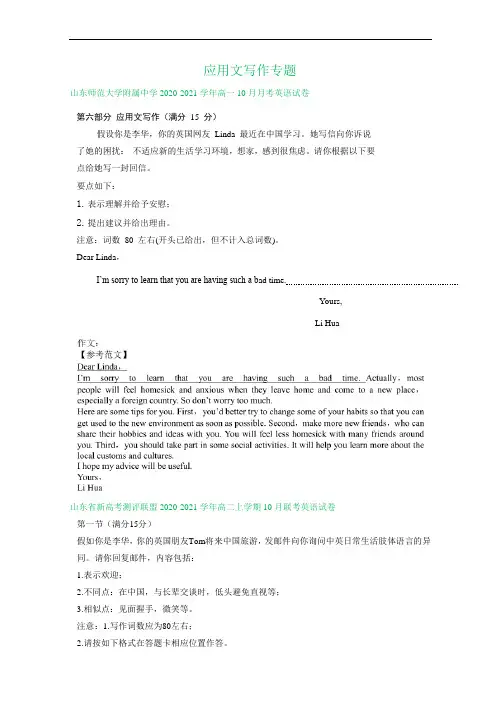
应用文写作专题山东师范大学附属中学2020-2021学年高一10月月考英语试卷第六部分应用文写作(满分15 分)假设你是李华,你的英国网友Linda 最近在中国学习。
她写信向你诉说了她的困扰:不适应新的生活学习环境,想家,感到很焦虑。
请你根据以下要点给她写一封回信。
要点如下:1.表示理解并给予安慰;2.提出建议并给出理由。
注意:词数80 左右(开头已给出,但不计入总词数)。
Dear Linda,I’m sorry to learn that you are having such a b ad time.Yours,Li Hua山东省新高考测评联盟2020-2021学年高二上学期10月联考英语试卷第一节(满分15分)假如你是李华,你的英国朋友Tom将来中国旅游,发邮件向你询问中英日常生活肢体语言的异同。
请你回复邮件,内容包括:1.表示欢迎;2.不同点:在中国,与长辈交谈时,低头避免直视等;3.相似点:见面握手,微笑等。
注意:1.写作词数应为80左右;2.请按如下格式在答题卡相应位置作答。
Dear Tom,_________________________________________________________________________________________________________________________________________________________Yours,Li Hua山东省六校2020-2021学年高一上学期阶段性联合考试英语试题第一节(满分25分)假定你是高一新生李华,你的美国笔友David 来信询问你的近况,请你用英文给他写一封电子邮件,内容包括:1. 难忘的军训;2. 结识的新朋友/新老师;3. 个人感悟。
注意:1. 写作词数应为100左右;2. 请按如下格式在答题卡的相应位置作答。
参考词汇:军训 military trainingOne possible version :Dear David ,I’m glad to receive your letter asking me about my high school life.Life for a freshman like me is really challenging. At the beginning of this new term, a strict butexciting seven-day military training was held. Tired as I was, it built up my body and tested my will.New life on campus provides opportunities to make some new friends, with whom views can beexchanged in depth. There are various extra-curricular activities, which can greatly enrich my schoollife. As for my new teachers, it seems that every teacher can make their lessons lovely and interesting.As you can see, I’m adapting to the fresh life. How about you?Best regards!Yours,Li Hua山东省济南市长清第一中学2020-2021学年高一上学期第一次月考英语试题第二节书面表达(满分25分)假定你是李华,你的英国朋友Alex给你发来一封邮件,信中提及他喜欢户外运动和骑自行车。
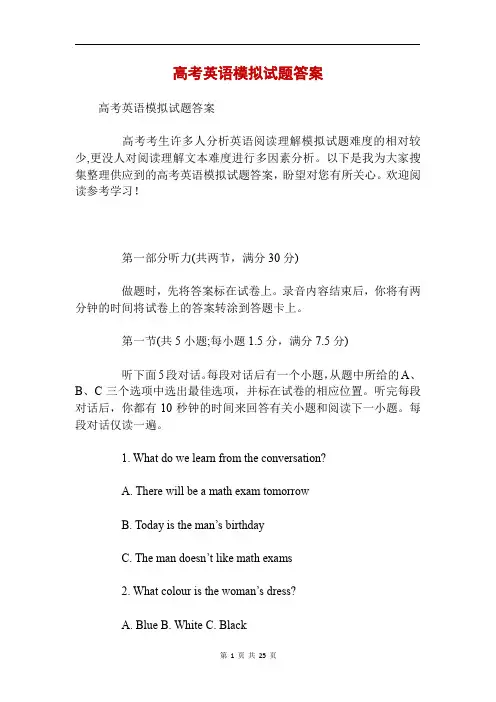
高考英语模拟试题答案高考英语模拟试题答案高考考生许多人分析英语阅读理解模拟试题难度的相对较少,更没人对阅读理解文本难度进行多因素分析。
以下是我为大家搜集整理供应到的高考英语模拟试题答案,盼望对您有所关心。
欢迎阅读参考学习!第一部分听力(共两节,满分30分)做题时,先将答案标在试卷上。
录音内容结束后,你将有两分钟的时间将试卷上的答案转涂到答题卡上。
第一节(共5小题;每小题1.5分,满分7.5分)听下面5段对话。
每段对话后有一个小题,从题中所给的A、B、C三个选项中选出最佳选项,并标在试卷的相应位置。
听完每段对话后,你都有10秒钟的时间来回答有关小题和阅读下一小题。
每段对话仅读一遍。
1. What do we learn from the conversation?A. There will be a math exam tomorrowB. Today is the man’s birthdayC. The man doesn’t like math exams2. What colour is the woman’s dress?A. BlueB. WhiteC. Black3. When did the man’s daughter set a new world record?A. In 1999B. In 2022C. In 20224. What does he man mean?A. He moved the desk aloneB. He had some classmates move the deskC. His classmates helped him move he desk5. What time is it now?A. 3:10B. 3:15C. 4:10其次节(共15小题;每小题1.5分,满分22.5分)听下面5段对话或独白。
每段对话或独白后有几个小题,从题中所给的A、B、C三个选项中选出最佳选项,并标在试卷的相应位置。
第3节形容词和副词Step1 典题感悟·高考名题这样考考查角度1形容词和副词原级1.(2019·全国卷Ⅲ) They also shared with us many ____________(tradition) stories about Hawaii that were ____________(huge) popular with tourists.[解析]第一个空考查形容词。
空格修饰名词stories,应用形容词形式,tradition的形容词为traditional,故填traditional。
第二个空考查副词。
空格处单词修饰形容词popular,应用副词形式,huge 的副词为hugely,故填hugely。
[答案]traditional; hugely2.(2019·天津卷)A dog's eating habit requires regular training before it is ____________(proper) established.[解析]考查副词。
根据句意:在狗的饮食习惯被正确地建立之前,需要定期的训练。
properly“正确地”,用副词来修饰动词。
[答案]properly3.(2018·全国卷Ⅰ)Running is cheap, easy and it's always ____________(energy).[解析]考查形容词。
and连接两个并列分句,两个分句都表示跑步的特征,and前面的cheap和easy均为形容词,故此处应用形容词energetic作表语,意为“需要能量的,剧烈的”。
[答案]energetic4.(2018·全国卷Ⅱ)According to the World Bank, China accounts for about 30 percent of total ____________ (globe) fertilizer consumption.[解析]考查形容词。
高考英语应用文真题及优秀模拟试题集锦No.1(2020年新高考山东卷)假定你是李华,上周日你校举办了5公里越野赛跑活动。
请你为校英文报写一篇报道,内容包括:1. 参加人员;2. 跑步路线:从校门口到南山脚下;3. 活动反响。
注意:1. 写作词数应为80左右: 2. 请按如下格式在答题卡的相应位置作答。
A Cross-Country Running RaceA 5000-meter cross- country running was held by the students' union last Sunday.150 participants from three grades got involved in the race actively. The race route started at the school gate and ended at the foot of the South Hill.The race turned out to be a great success. Tired as we were, we benefited a lot.Not only does it strengthen our body, but also it tests our will and enriches our school life.No.22020年普通高等学校招生全国统一考试(山东模拟卷)假定你是李华,你的英国朋友John来信询问中国人过春节的风俗习惯。
请你结合自己家乡的实际情况给他回信,内容包括:1.春节的简介;2.过节的风俗习惯;3.邀请他来中国过春节。
注意:1.词数80左右;2.可以适当增加细节,以使行文连贯;3.信的开头已为你写好。
Dear John,I’m glad that you’re interested in the Chinese Spring FestivalThe Spring Festival is the most ceremonious traditional festival of the Chinese nation. It is a happy and peaceful festival for family and friends to get together and a bond for people to deepen their feelings. In order to celebrate the Spring Festival, we will stick couplets, set off firecrackers, have dinner, watch the Spring Festival Gala, and so on. There is a joyful atmosphere everywhere.I’d like to invite you to China for the Spring Festival with us.Yours,Li HuaNo.3(2021 年8省联考)假定你是李华,准备参加学校组织的英文诗朗诵比赛。
必修① Unit 1单元检测A——语言基础扎根练+阅读理解提速练[语言基础扎根练]Ⅰ.单词拼写/用所给词的适当形式填空1.(2018·济南模拟)In ancient times, wealth was measured and exchanged (交换)in things that could be touched: food,tools,and precious metals and stones.2.I had a struggle (努力) to make myself heard in all the noise.3.(2017·全国卷Ⅲ)But unlike her school friends, 16-year-old Sarah is not spending half-term resting. Instead, she is earning (赚,挣得) £6,500 a day as a model in New York.4.Then he smiled and told me I would receive an extra (额外的) $100 a year.5.I have got used to the Chinese food, but I don't like it when a Chinese host (主人) keeps serving me the food that I don't like.6.After many years of hard work, our former (以前的) teacher has changed so much.7.A traditional Chinese wedding ceremony is an event (重要事件) on which girls show their top beauty.8.Instead of shouting empty slogans, it is more meaningful to donate (捐助) books and sports goods to children in need.9.Much to his satisfaction (satisfy), his son was admitted to Peking University.10.I quickly became an active participant, devoting (devote) entire mornings to reading and replying to postings.11.More programs of employment promotion shall be introduced to college graduates (graduate).12.Our foreign teacher speaks Chinese very fluently (fluent) as if he were a Chinese.13.The town has been all painted up in preparation (prepare) for the event.14.We prefer some more_experienced (experience) workers to work for us.15.He found his new job a little challenging (challenge) because of his lack of much knowledge.Ⅱ.单句改错1.Good use should be made our time to do useful and productive things.在made之后加of2.In the end of the meeting, it was announced that an agreement had been reached. In→At3.It was very foolish for the boy to swim in the river alone.for→of4.You can eat in my restaurant with free whenever you like, Jim. with→for5.At arriving in Shanghai, she took a taxi to call on her aunt immediately.At→Upon/On 6.There were such many books in the shop that he didn't know which to buy. such→so Ⅲ.根据提示补全句子1.她是一位如此受人尊敬的老师以至于我们都爱戴她、尊重她。
高考英语模拟试题答案高考英语模拟试题第一部分:听力(共两节,每小题1.5分,满分30分)第一节(共5小题;每小题1.5分,满分7.5分)听下列5段对话,每段对话后有一个小题,从题中所给的A,B,C三个选项中选出最佳选项,并标在试卷的相应位置。
听完每段对话后,你都有10秒钟的时间来回答有关小题和阅读下一个小题。
每段对话仅读一遍。
1. What is the man?A. A ChineseB. An EnglishmanC. A teacher2. What did the woman think of the concert?A. She liked it.B. She thought it was a waste of time.C. She thought it was boring.3. What can be learned from the conversation?A. The teacher will give his students a test.B. The test will last till today.C. Jack had a test yesterday.4. What does the womans answer imply?A. They normally go to bed before 9:00.B. She doesnt want to go to bed so early.C. They usually go to bed at 9:00.5. What do we learn from the dialogue?A. If he lends her the money, she will be able to buy the book.B. She has enough money to buy the book.C. If she lends him the money, he will be able to buy the book.第二节(共15小题每小题1.5分,满分22.5分)听下面5段对话或独白。
2024年高考英语模拟试卷注意事项:1.答卷前,考生务必将自己的姓名、准考证号、考场号和座位号填写在试题卷和答题卡上。
用2B铅笔将试卷类型(B)填涂在答题卡相应位置上。
将条形码粘贴在答题卡右上角"条形码粘贴处"。
2.作答选择题时,选出每小题答案后,用2B铅笔把答题卡上对应题目选项的答案信息点涂黑;如需改动,用橡皮擦干净后,再选涂其他答案。
答案不能答在试题卷上。
3.非选择题必须用黑色字迹的钢笔或签字笔作答,答案必须写在答题卡各题目指定区域内相应位置上;如需改动,先划掉原来的答案,然后再写上新答案;不准使用铅笔和涂改液。
不按以上要求作答无效。
4.考生必须保证答题卡的整洁。
考试结束后,请将本试卷和答题卡一并交回。
第一部分(共20小题,每小题1.5分,满分30分)1.—Would you please wait for a moment while I telephone the reception desk to check?—________.A.I wouldn't mind that B.Sound like funC.I mean it D.Y ou wish2.----What happened to the young trees we planted last week?---The trees_____________ well,but I didn't water them.A.might grow B.needn't have grownC.would grow D.would have grown3.The meeting planned next Monday is very important.A.to be held B.heldC.being held D.holding4.The world is not always ______we wish it to be.A.that B.whichC.what D.where5.In contrast with the liberal social climate of the present, traditions in the past were relatively ______. A.competitive B.comprehensiveC.creative D.conservative6.—Did you meet Mr. Smith?—Yes. When I arrived, he ________ for New York to attend a press conference.A.was just leaving B.just leftC.just leaves D.had just left7.He’s quite _________, but I can’t imagine him as president of suc h a large listed company.A.enthusiastic B.generousC.competent D.sympathetic8.No matter how carefully you plan your finances, no one can _______ when the unexpected will happen.A.prove B.implyC.demand D.predict9.—Mum, I broke Dad’s sunglasses th is morning.—You need to make an apology for your fault, ________ you will regret.A.and B.orC.but D.for10.The problem _______he will have his college education at home or abroad remains untouched.A.how B.whether C.that D.when11.The fellow we spoke ________ no comment at first.A.to make B.to madeC.made D.to making12.---How was your trip to Xi'an last month?--_____________. It was raining cats and dogs during my stay there.A.Wonderful B.ExcitingC.Not bad D.It couldn't be worse13.________is known to us is that tobacco contains nicotine and other harmful products,so you should give up smoking.A.As B.ItC.What D.Which14.They do have a different to the problem of overpopulation.A.solution B.opinionC.decision D.conclusion15.—People should stop using their cars and start using public transport.—________. The roads are too crowded as it is.A.All right B.ExactlyC.Go ahead D.Fine16.In the Name of People, a popular TV drama, shows a deep ________ on the fight against corruption. A.argument B.themeC.reflection D.impression17._______ those past years, we couldn’t help feeling sorry for our parents who never had a rest all the year round. A.Looking back upon B.Looking around C.Looking out D.Looking up18.They intended to have the school better equipped,the local government was not able to get enough money to do so.A.unless B.while C.although D.once19.“ ________ I went through ups and downs in life,” Gordon said, “I never found the importance o f beingselfdisciplined as well as the significance of life.”A.If B.SinceC.Until D.Unless20.We really emphasize the importance of putting______safeguards to prevent children’s identities from falling in wrong people’s hands.A.in place B.in vainC.in question D.in earnest第二部分阅读理解(满分40分)阅读下列短文,从每题所给的A、B、C、D四个选项中,选出最佳选项。
济南外国语学校英语模拟试题一第I卷第一部分听力(共两节,满分30分)第二部分:阅读理解(共两节,满分40分)第一节(共15小题;每小题2分,满分30分)阅读下列短文,从每题所给的四个选项(A、B、C和D)中,选出最佳选项,并在答题卡上将该项涂黑。
AGino Bartali’s story is one of the most dramatic examples during World War II of an Italian willing to risk his own life to save the lives of strangers. During his lifetime, Bartali didn't talk about his wartime activities. It was only after his death in 2000 that details began to emerge.Gino Bartali, a villager from a poor family, born in Florence in 1914, became a professional cyclist in 1935. He was reaching the peak of his career as the war approached. He won his first Giro d'Italia, one of the world’s biggest cycling races in 1936, retaining the title in 1937, and then in 1946. Much to Italy's delight, he won the Tour de France in1938 and 1948.At this point Bartali was asked to join a secret network offering protection and safe passages to Jews and other endangered people. His role in the network was uniquely suited to his talents - he became a courier(情报员).On the face of it he was undertaking the long training rides, but in reality he was carrying photographs and counterfeit(伪造的)identity documents to and from a secret printing press.All were hidden in the frame and handlebars of his bicycle. He travelled thousands of kilometres across Italy, travelling the roads between cities as far apart as Florence, Lucca, Genoa, Assisi, and the Vatican in Rome. By taking on this role, he put himself at huge risk. At one point he was arrested and questioned by the head of the secret police in Florence, where he lived. In spite of knowing that the Germans were killing everybody who was hiding Jews, he still hid his Jewish friend. He was risking not only his life but also his family."When people were telling him, 'Gino, you're a hero', he would reply, 'No, no - I want to be remembered for my sporting achievements. Real heroes are others, those who have suffered in their soul, in their heart, in their spirit, in their mind, for their loved ones. Those are the real heroes. I'm just a cyclist.'"21. The underlined word in Paragraph 1 probably means ___________.A. appearB. downloadC. boomD. apply22. What can we learn about Gino Bartali?A. He hid messages in his suit.B. He founded a secret network.C. He won five champions in all.D. He was proud of his saving Jews.23. What did Gino Bartali hope to be remembered?A. A hero saving Jews.B. A man loving his family.C. A person fighting for his country.D. A cyclist making great achievement.BAnyone can be a scientist —if they are willing to work hard. Sometimes, though, kids don’t get that message.An adult may tell them outright that science or math is not for them. Often, however, the message will be more subtle(微妙的).Some teacher, parent or role model may say or do something to make a child think that they aren’t — and cannot be — good at science, technology, engineering or math (STEM).In the United States and many other countries, society has created some stereotypes —commonly accepted attitudes —that fight the idea that STEM is for all. For instance, there’s a stereotype in American culture that boys are better at math and girls are better at reading. This isn’t true. Yet students “pick up on these societal stereotypes very early,” says Susan Levine. And scientists are just beginning to understand how that happens.“It’s very helpful to be STEM educated,” notes Levine, a developmental psychologist at the University of Chicago in Illinois. Being comforta ble with math, especially, “is related not just to STEM career paths but longevity, survival, health,” she points out. Science and math also are useful in many everyday tasks, from cooking to taking medicines.But whether children and teens feel they have a talent for science and math is more complex than just the impressions they might pick up from society, notes Jacue Ecc. She works at the University of California, Irvine. There, she studies why people make the choices they do about jobs and education. People use all types of information to decide how good they are at something, she says. They consider how well they do on tests. They pay attention to how hard they have to work to master certain topics at school. They listen to their parents, teachers and peers. They also look at whether people they want to follow — role models — are doing science.24. What are kids often told?A. They need to work hard.B. They are not good at STEM.C. They should love parents and teachers.D. They need support from their families.25. What does the underlined word in Paragraph 3 probably mean?A. different types of stereosB. all sorts of prejudicesC. fixed social impression or attitudeD. common ways of seeing things26. What does Levine think of science and math?A. They are of much use in our daily life.B. They are not related to STEM business.C. They are helpful and comfortable to educate.D. They are paths to stay healthy with medicines.27. What does the last paragraph tell us?A. Children make choices only by admiring othersB. Choosing to do science or math is too complicatedC. Why Jacue Ecc studies people’s choices to do science or mathD. How people choose jobs and education according to their interestCMany people say they wouldn't cheat on a test, lie on a job application or refuse to help a person in need. But what if you have to face the test answers and cheating didn't require any work on your part? If you didn't have to face the person who needed your help and refuse them? Would that change your behavior?New research shows it might. In two studies that tested participants' willingness to behave immorally, the research team discovered people will behave badly -- if it doesn't involve too much work on their part.In one study, participants took a math test on a computer after being warned there were problems in the system. One group was told if they pressed the space bar, the answer to the question would appear on the screen. The second group was told if they didn't press the enter key within five seconds, the answer would appear. "People in the second group -- those who didn't have to physically press a button to get the answers -- were much more likely to cheat," says Associate Psychology Professor Michael Inzlicht, second author on the study.In another study, the team asked participants whether they would volunteer to help a student with a learning disability complete a component(组成部分)of the test. One group of participants had only the freedom to check a 'yes' or 'no' box on the computer. The second group of people could follow a link at the bottom of the page to volunteer their help or simply press 'continue' to move on to the next page of their test. Participants were five times more likely to volunteer when they had to pick either 'yes' or 'no.'"When people are faced with actively doing the right thing or the wrong thing, there are a lot of emotions involved -- such as guilt and shame -- that guide them to make the moral choice. When the transgression(违反准则)is more passive, however, we saw more people doing the wrong thing, and we believe this is because the moral emotions in such situations are probably less serious." Teper says."Forcing people to make an active, moral decision is going to be much more effective than allowing them to passively skip over a request," he says.28. What is the new research mainly about?A. People behave badly if not required too much on their part.B. Most of the tested participants wouldn’t cheat or tell lies.C. It’s too difficult to behave badly for people.D. People are unwilling to behave immorally.29. The underlined word “immorally” in Paragrap h 2 can be replaced by _________.A. positivelyB. badlyC. indifferentlyD. cautiously30. In the first study, people in Group 2 were much more likely to cheat because ______.A. They were asked to do so.B. It doesn’t involve too much work on their part.C. They can get fun from it.D. It’s typical of them to cheat.31. What should we do to guide people to make moral choice?A. Allow them to passively skip over the request.B. Make them feel guilty to avoid bad behavior.C. Force them to make a moral decision.D.Try to involve as many as emotions.DThis time of year many of us decide to get back into shape. But if you are having trouble fitting into your tight jeans, it may not be your fault. Scientists now believe that willpower alone is not enough to lose weight. They say success depends on your genes, hormones and psychology.A study of 75 people by Oxford and Cambridge Universities has looked into why one-size-fits-all diets are often not successful. The scientists divided over-eaters into three groups – people who feast, people who constantly crave food and emotional eaters. They tailored diets to the needs of each group.Feasters can’t stop eating once they start. This is because they don’t have the hormones that tell them when they are full. Scientists designed a diet for this group featuring high protein foods that make them feel full for a long time. This included fish, chicken, basmati rice and grains. Bread and potatoes were not allowed because they do not fill you up for long.Constant cravers always feel hungry. Scientists say that certain genes disrupt the messages the stomach sends to the brain saying it is full, meaning the cravers always feel like they need more fatty, sugary food. Dieting seven days a week is very hard for these people, so scientists put them on a normal, healthy diet five days a week, and cut their calorie intake to 800 on two days a week. Emotional eaters have got into the habit of eating whenever they feel stressed. To help them change this behavior, scientists offered them group support in meetings and online as well as a diet. During the study, people from all three groups lost weight on the tailored diets, with feasters losing the most and constant cravers losing the least.So what about you? If any of the eating habits sound familiar, perhaps you should consider a new approach to slimming for 2015.32. Which of the following is proper for feasters?A.Eat more high protein foods.B.Take a normal diet five days a week.C.Support each other in groups.D.Just eat fish, chicken and grains.33. Constant cravers feel like more food because of their _______A.bad habitB. genesC. hormonesD. weak willpower34. What can we infer from the text?A.You can lose weight with strong willpower.B.One-size-fits-all diets are not successful.C.Emotional eaters losing the most on the tailored diets.D.Different people should try different methods to lose weight.35. The text is probably taken from ________.A.science fictionB. a student bookC. a scientific reportD. a bulletin board第二节(共5小题;每小题2分,满分10 分)根据短文内容,从短文后的选项中选出能填入空白处的最佳选项。